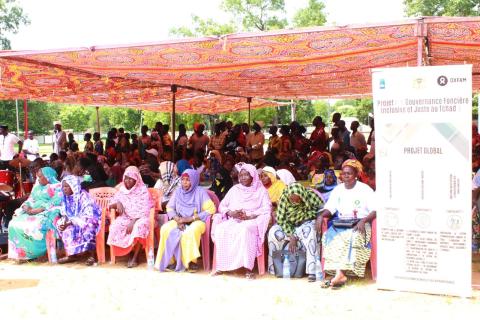Location
The Food and Agriculture Organization of the United Nations leads international efforts to defeat hunger. Serving both developed and developing countries, FAO acts as a neutral forum where all nations meet as equals to negotiate agreements and debate policy. FAO is also a source of knowledge and information. We help developing countries and countries in transition modernize and improve agriculture, forestry and fisheries practices and ensure good nutrition for all. Since our founding in 1945, we have focused special attention on developing rural areas, home to 70 percent of the world's poor and hungry people.
Members:
Resources
Displaying 131 - 135 of 168Burundi Landscape Restoration and Resilience Project
Objectives
To restore land productivity in targeted degraded landscapes and, in the event of an Eligible Crisis or Emergency, to provide immediate and effective response to said Eligible Crisis or Emergency
Other
Note: Disbursement data provided is cumulative and covers disbursement made by the project Agency.
LAND-at-scale Chad- Land reform based on rapid evolution and present crisis
General
Chad is at the verge of an emerging land tenure crisis. As observed in many countries in Africa, formal and customary tenure systems overlap. Customary tenure systems, that generally prevail in rural areas, differ from region to region, with each its own needs and practices. Land conflicts are abundant, caused by degradation and transformation of land surfaces caused by climate change, as well as land investments by domestic investors with disputed legitimacy. Women, particularly, struggle in practice to obtain the same rights to land as men, even though country’s constitution enshrines gender equality. These land challenges play against a backdrop of a country in conflict. A land tenure crisis could lead to more disputes over land, weakened land productivity, uncontrolled urban development, and result in further social unrest of the country if not adequately addressed. Project objective The project aims to contribute to a more transparent and inclusive land administration system in Chad, especially for tenure insecure groups (women and youth), which creates security for communities to invest in sustainable income generating activities. Project strategies - Finalization of the Land Code: a review and rewrite of the content, combined with a multi-stakeholder validation workshop - Support to socio-economic land reform, with special attention for inclusion of women and youth, strengthening civil society organizations, capacity building on agricultural practices and dispute resolution mechanisms. - Improving the land registration system in N’Djamena by developing a blueprint of the current situation and roadmap towards the preferred future situation, together with the relevant government authorities in Chad.
Support the implementation of the Voluntary Guidelines on the Responsible Governance of Tenure in Malawi
General
Sweden identified itself as a resource partner to support the implementation of the Voluntary Guidelines on the Responsible Governance of Tenure of Land, Fisheries and Forests in the Context of National Food Security (VGGT). In 2014, Sweden financed a technical workshop in Malawi, which took place during 14-16 July, 2014 in collaboration with the Ministry of Land, Housing and Urban Development, Malawi. The workshop brought together a wide range of participants from land, agriculture, fisheries and forestry sectors from governments, district administration officials, civil society organizations and the private sector. A multi-stakeholder national platform was created to support and track VGGT implementation in Malawi.
Support to and Capitalization on the EU Land Governance Programme Phase II
General
This project complements the project 'Support to and Capitalization on the EU Land Governance Programme in Africa' and is aimed at facilitating the integration of eigtht new in-country projects (Brazil, Cameroon, Columbia, Ghana, Guinea Bissau, Pakistan, Sudan and Uganda) into the existing mechanisms for transversal support under Phase I and enhances support by building on lessons learnt and additional needs particularly in the area of capacity development. All activities under Phase II will be interlinked, jointly implemented and mutually supportive of each other and of activities planned under Phase I. The following areas of work are addressed under this phase: (i) VGGT are mainstreamed in project during the project start-up phase; (ii) Activities of the in-country projects are capitalized and coordinated; (iii) Capacities of project staff, national counterparts and other stakeholders are developed; (iv) In-country projects receive direct support from FAO; (v) Monitoring is enhanced and lessons learnt are documented and disseminated.
Support for Responsible Land and Natural Resource Governance in Communal Lands of Kenya
General
The main objective of the project is to support the government’s efforts to secure and improve equitable access to land and natural resources for food security and socio-economic development of agro-pastoral communities in the ASALs of Kenya. The project will adopt mainstreaming of the Voluntary Guidelines on the Responsible Governance of Tenure of Land, Fisheries and Forests in the context of National Food Security and the Framework and Guidelines (F&G) on Land Policy in Africa.




